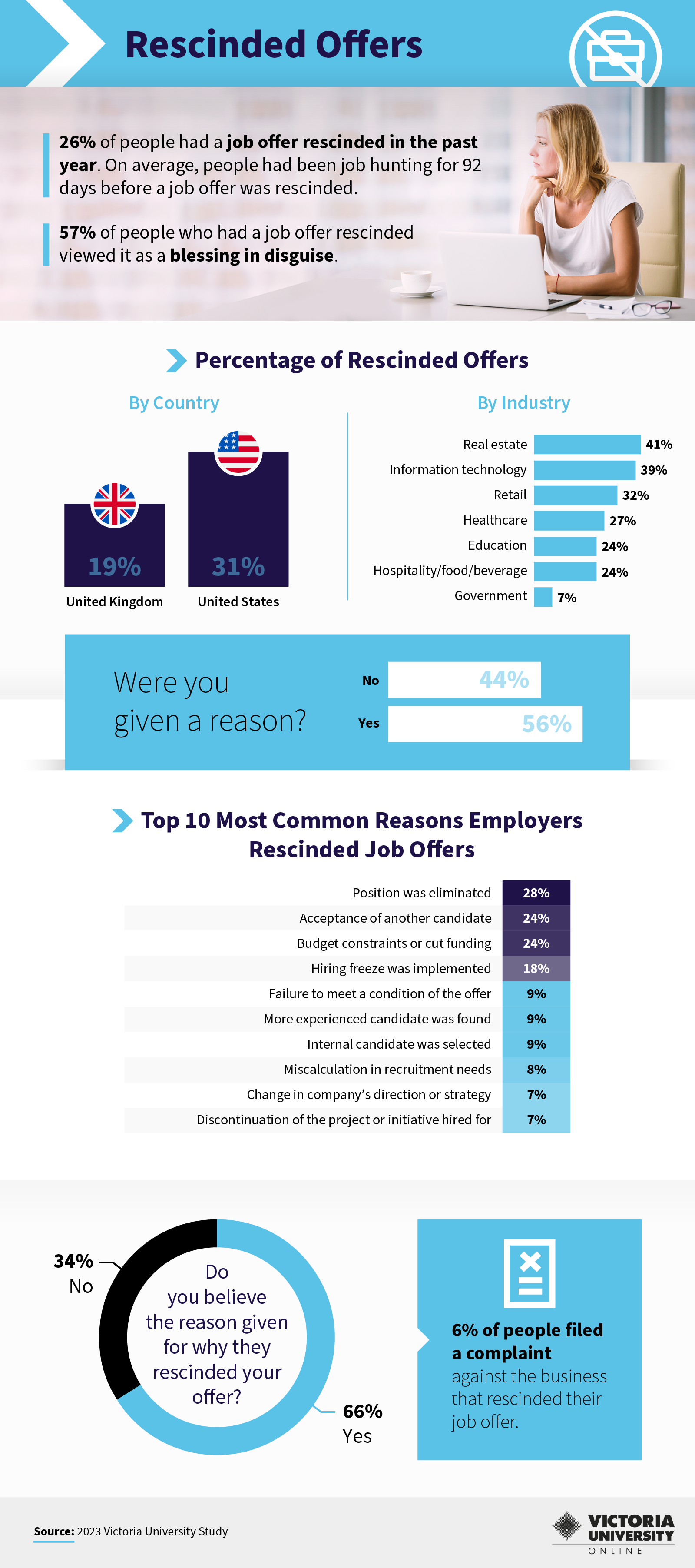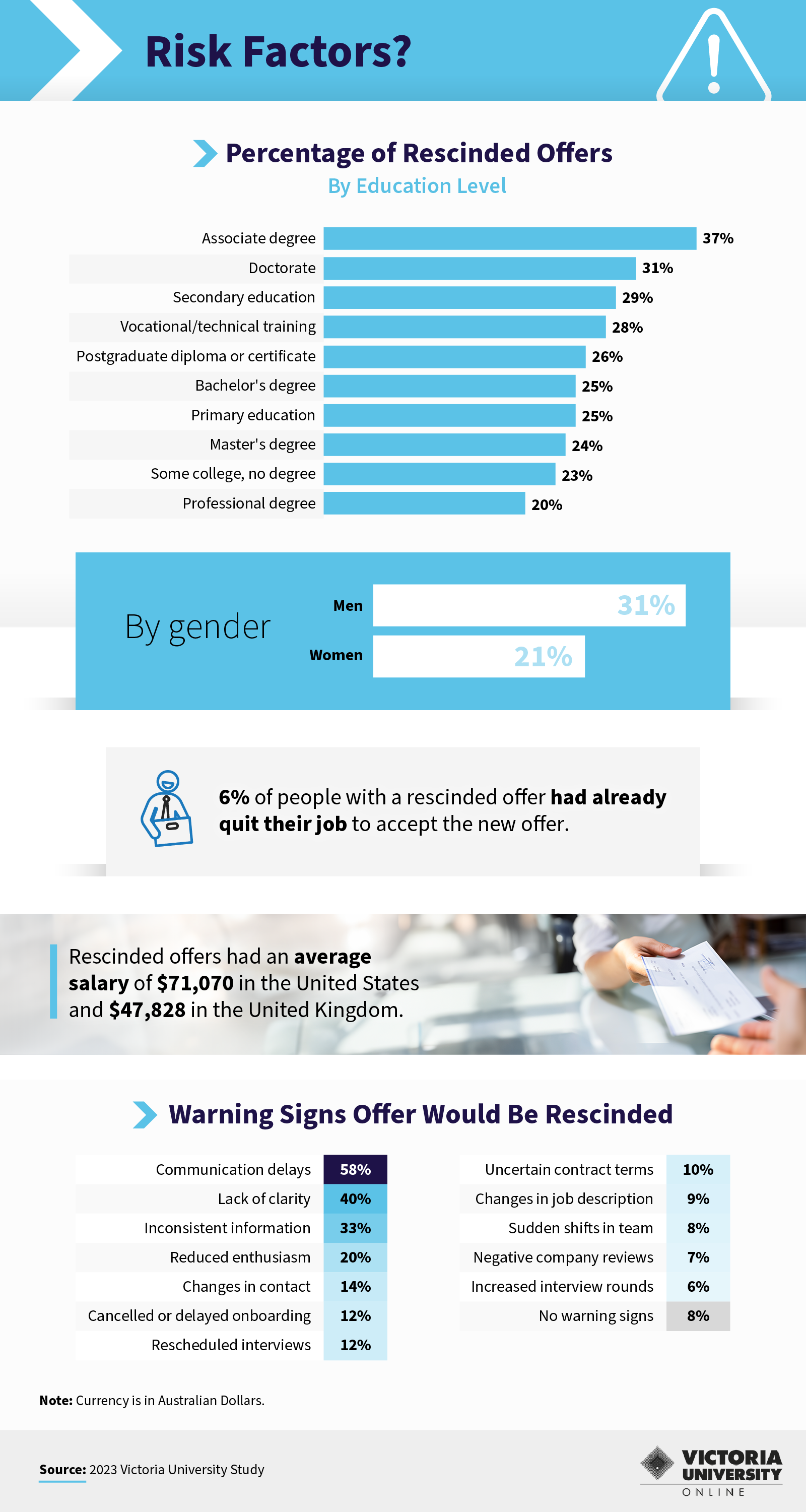
Promised today, pulled tomorrow: Insights into the rescinded job offer trend
Key takeaways
- 26 per cent of people had a job offer rescinded in the past year.
- The top warning signs before a rescinded job offer are communication delays, lack of clarity and inconsistent information.
- Over one in four people secured a new job offer after having one rescinded: 69 per cent said the new offer had better pay than the rescinded one.
- 44 per cent of people who had a job offer rescinded did not receive an explanation.
- 57 per cent of people who had a job offer rescinded view it as a blessing in disguise.
- Real estate has the most rescinded job offers of any industry.
Influenced by rapid technological shifts and unpredictable economic factors, the contemporary job market poses unique challenges for job seekers worldwide. One challenge is the rise of rescinded job offers. How prevalent is this trend? Are specific industries or demographics more vulnerable to rescinded offers than others?
To learn more about rescinded job offers, we conducted a comprehensive survey involving over 1,000 respondents from Australia, the United Kingdom and the United States. Our findings shed light on the scale and nature of rescinded job offers and offer guidance for those navigating the job market.
The bittersweet reality of rescinded offers
In a job market filled with uncertainties, rescinded job offers introduce another layer of complexity for hopeful candidates. How common are these employment setbacks and why do they happen?

Infographic Transcript
Rescinded Offers
- 26 per cent of people had a job offer rescinded in the past year. On average, people had been job hunting for 92 days before a job offer was rescinded.
- 57 per cent of people who had a job offer rescinded viewed it as a blessing in disguise.
The percentage of rescinded job offers varies by country. Survey shows that 19 per cent of offers are withdrawn in the United Kingdom, compared to 31 per cent in the United States.
Additionally, the rate of rescinded job offers differs by industry, as illustrated in the list below:
- Real estate—41 per cent
- Information technology—39 per cent
- Retail—32 per cent
- Healthcare—27 per cent
- Education—24 per cent
- Hospitality/food/beverage—24 per cent
- Government—7 per cent
Forty-four percent of respondents indicated that no reasons were provided for the offer being rescinded, while 56 per cent reported that reasons were indeed given.
Top 10 most common reasons employers rescinded job offers:
- Position was eliminated—28 per cent
- Acceptance of another candidate—24 per cent
- Budget constraints or cut funding—24 per cent
- Hiring freeze was implemented—18 per cent
- Failure to meet a condition of the offer—9 per cent
- More experienced candidate was found—9 per cent
- Internal candidate was selected—9 per cent
- Miscalculation in recruitment needs—8 per cent
- Change in company's direction or strategy—7 per cent
- Discontinuation of the project or initiative hired for—7 per cent
Of those who were provided with a reason for the offer being rescinded, only 66 per cent accept the rationale, while 34 per cent do not.
Results also show that 6 per cent of people filed a complaint against the business that rescinded their job offer.
Source: 2023 Victoria University Study
Securing a job offer is a significant achievement, especially with the increased difficulty in job hunting. However, 26 per cent of individuals saw this accomplishment reversed when they had an offer rescinded in the past year. While 44 per cent of those who had offers rescinded received no rationale, transparent employers blamed everything from eliminated positions to failure to meet offer conditions to changes in company strategy. Two-thirds of those who had an offer rescinded believed the reason given, but 6 per cent filed complaints against would-be employers.
Among employers, the real estate industry had the most rescinded offers at 41 per cent, likely due to volatile housing markets worldwide. Information technology had the second-most revoked offers at 39 per cent, followed by retail at 32 per cent. Government jobs offered the most security, as only 7 per cent of potential government employees had an offer rescinded.
Despite the unexpected setback of a rescinded offer, not every worker felt negatively about the experience. Over half (57 per cent) of affected candidates viewed the lost opportunity as a blessing in disguise.
Contributing causes and warning signs
Looking more closely at rescinded job offers, what factors affect them? Are there warning signs that can prepare candidates beforehand?

Infographic Transcript
What are the risk factors?
The percentage of rescinded offers by education level:
- Associate degree—37 per cent
- Doctorate—31 per cent
- Secondary education—29 per cent
- Vocational/technical training—28 per cent
- Postgraduate diploma or certificate—26 per cent
- Bachelor's degree—25 per cent
- Primary education—25 per cent
- Master's degree—24 per cent
- Some college, no degree—23 per cent
- Professional degree—20 per cent
The percentage of rescinded offers by gender:
- Men—31 per cent
- Women—21 per cent
Survey shows the 6 per cent of people with a rescinded offer had already quit their job to accept the new offer.
Rescinded offers had an average salary of $71,070 in the United States and $47,828 in the United Kingdom.
Warning signs that an offer would be rescinded:
- Communication delays—58 per cent
- Lack of clarity—40 per cent
- Inconsistent information—33 per cent
- Reduced enthusiasm—20 per cent
- Changes in contact—14 per cent
- Cancelled or delayed onboarding—12 per cent
- Rescheduled interviews—12 per cent
- Uncertain contract terms—10 per cent
- Changes in job description—9 per cent
- Sudden shifts in team—8 per cent
- No warning signs—8 per cent
- Negative company reviews—7 per cent
- Increased interview rounds—6 per cent
Note: Currency is in Australian Dollars.
Source: 2023 Victoria University Study
Candidates’ educational backgrounds did not protect them against rescinded offers. Those holding an associate degree faced the highest percentage of rescinded offers at 37 per cent, but candidates with doctorates had the second-highest rate at 31 per cent. Meanwhile, candidates with some college experience but no degree had the second-lowest rate of rescinded offers at just 23 per cent. Individuals with professional degrees like MBAs (20 per cent) were the least likely to have an offer rescinded.
No matter the job candidates’ education levels, the financial implications of these broken offers were significant. The average salary of rescinded offers was $71,070 (US$45,660) in the United States and $47,828 (£25,148) in the United Kingdom. For a notable 6 per cent, the sting was even more profound because they had already quit their previous job before their new employer rescinded the offer.
Reviewing the hiring experience, candidates identified warning signs that could have prepared them before an offer fell through. The top indicators of a shaky job offer were communication delays (58 per cent), lack of clarity (40 per cent) and inconsistent information (33 per cent) provided by the prospective employer. Another 20 per cent experienced reduced employer enthusiasm and 14 per cent dealt with changing company contacts.
Bouncing back and safeguarding future pursuits
Despite the disheartening experience of a rescinded offer, many job seekers bounce back with even brighter prospects. How quickly are they finding new opportunities and what can potential candidates do to avoid such pitfalls in the first place?

Infographic Transcript
Future forward
Over 1 in 4 people secured a new job offer after having one rescinded. On average, it took 33 days to receive the next offer.
The majority of respondents who secured a new job offer after having one rescinded said the new offer had better pay (69 per cent), better benefits (67 per cent), and a better title (57 per cent).
Most common "Red Flags" in job postings:
- Seems too good to be true—70 per cent
- Vague job description—67 per cent
- Lack of salary information—57 per cent
- Grammatical errors—54 per cent
- No clear contact information—48 per cent
- Unrealistic hours—45 per cent
- Lack of website or online presence—44 per cent
- No clear job title—39 per cent
- Use of the phrase "Work hard, play hard"—38 per cent
- Excessive qualifications—32 per cent
- Describing the company or team as a "family"—28 per cent
- Immediate hiring—22 per cent
Source: 2023 Victoria University Study
After the initial setback of a rescinded offer, over one in four individuals landed a new job within 33 days, on average. As a reward for their resilience, 69 per cent reported that their subsequent job offer boasted a higher salary, 67 per cent indicated enhanced benefits and 57 per cent secured a position with a more senior title.
For those who would rather skip the emotional pitfalls of a rescinded offer, respondents identified some common “red flags” in job postings. The most common red flag was a job that seemed too good to be true; 70 per cent of respondents warned against this type of job post. Another 67 per cent warned of vague job descriptions. Job seekers may also want to be cautious of job listings without salary information, contact information, or a job title.
The modern job landscape offers many challenges. While no industry or demographic is safe from the setback of revoked offers, job seekers can protect themselves by identifying red flags in job postings and looking for warning signs during the hiring process.
The good news is a rescinded job offer does not signal the end of the employment road. Remaining resilient and persistent, disappointed candidates can look forward to bigger and better offers.
Elevate your career with VU Online
If you are looking to gain skills that will make you stand out to prospective employers, our 100% online MBA could be for you.
VU Online’s award-winning postgraduate Block Model ® is a unique way to fast-track your studies and launch yourself into the profession you’ve always wanted sooner. The MBA can be completed in two years part-time and because it’s online, you can study when it suits you.
Check out the MBA course page for information on the course, or speak to one of our Student Enrolment Advisors to find out more. We can talk you through the options for flexible study, whether studying an MBA specialisation is right for you and your eligibility for the course.
Methodology
We surveyed 1,007 respondents from Australia, the United Kingdom and the United States. Of those, 39 per cent were from the U.K., 60 per cent were from the U.S. and 1 per cent were from Australia. Among respondents, 52 per cent were men, 46 per cent were women and 1 per cent were non-binary. By generation, 9 per cent were baby boomers, 19 per cent were Gen X, 60 per cent were millennials and 12 per cent were Gen Z.
Fair use statement
Do you know someone navigating the modern job market? Feel free to share this article for non-commercial purposes, but ensure you link back to this page so readers can delve into our complete findings and methodology.



